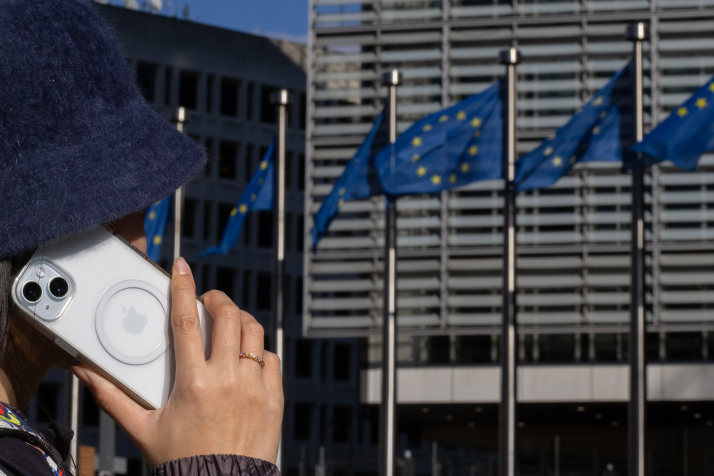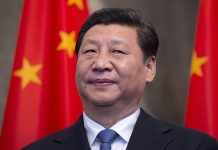On May 29, a court in Shanghai dismissed a case filed by a local consumer, who attempted to force U.S. tech company Apple Inc. to cease charging its 30-percent commission on purchases in its App Store.
Jin Xin, the consumer, brought the suit against Apple China in 2021. In addition to calling on the company to cease charging commissions, Jin insisted that consumers be allowed to use other payment systems besides Apple Pay when purchasing apps or services on Apple products, and asked for 100,000 yuan ($13,800) in compensation for commissions he’d previously paid.
The Shanghai Intellectual Property Court said it had compared the commission Apple charges in the App Store with that charged on other app marketplaces, and did not find the former to be “much higher” than those on Android systems. The court also found that limiting payment methods helps ensure data security, and has not disrupted commercial competition.
One of Jin’s attorneys, Wang Qiongfei, told National Business Daily newspaper the case is the first to be filed by a Chinese consumer against the Apple tax and the company’s monopoly. In addition to individual users, Chinese companies are also in a weak position. Chinese online game developers like miHoYo have tried to introduce new payment channels to avoid the Apple tax, but Apple closed the channels in less than a month.
“The commissions Apple charges in China are the highest in the world, and the company has not allowed third-party payment for in-app purchases. It abuses its dominant role in the market, denying Chinese consumers options and increasing the costs of Chinese enterprises,” Wang said.
Wang said he will continue to pursue Apple China through the courts. Anti-monopoly authorities need to further improve investigation and law enforcement to reduce the Apple tax, Wang added.
The tax
While Google cut the commission charged on products and services in its app marketplace, the Google Play Store, to 15 percent in 2021, Apple continues to charge up to 30 percent commission fee on app developers’ revenue from the App Store and in-app payment systems, meaning that 15 to 30 percent of consumers’ payments go to Apple. This “Apple tax” applies to the purchase of apps and also in-game purchases, tipping influencers and getting subscriptions on video and social media platforms.
With the extra tax, users pay more for Apple products and services than similar ones from other companies. If developers of virtual services apps like mobile games and livestreaming refuse to accept the tax or provide other payment platforms for in-app purchases, Apple will remove the apps from its App Store.
The tech titan’s financial results for the full fiscal year 2023, which ended on September 30, 2023, showed that its services division, including the Apple Store, Apple Pay, music and video streaming and iCloud, generated $85.2 billion in revenue.
According to Sensor Tower, a U.S.-based mobile app market intelligence firm, Apple’s revenue from its tax reached around $22.34 billion globally last year, with $5.5 billion of that coming from the Chinese market.
“Currently, the Apple tax has become a major revenue source for the company,” Pan Helin, a researcher with the International Business School at Zhejiang University, told Beijing Review.
According to Pan, Apple targets medium-to-high income earners. With its user-friendly system, many consumers are loyal to the brand and willing to accept the extra fees, especially those already accustomed to the Apple system.
But not everyone is willing to accept the Apple tax. Jin found that, purchased through the same app, the price of digital goods and services is higher on iPhones than on Android phones, and Apple product users can only purchase these goods and services through the App Store, whereas Android users have access to multiple purchase platforms.
While Android users need to pay around $14, Apple users pay over $16 for a one-year subscription to Weibo, the Chinese equivalent of X. To tip an online influencer, Apple users pay more than Android users. But there are also apps with the same prices in Android and Apple app stores.
Pan said that while the Apple tax is not differential pricing, basing prices on who’s buying, when and where, it is unfair to consumers. “It should be the app developers that pay commissions to the App Store, but Apple instead passes them on to consumers. Android systems do not directly charge fees from consumers like Apple does, but still make profits through advertisements,” he said.
The compromise
Several companies have spoken against the notorious tax. The U.S. game company Epic Games filed an antitrust lawsuit in 2020, accusing Apple of acting as an illegal monopolist by requiring consumers to buy all digital products, including those offered by the games company, through the App Store. In January, the U.S. Supreme Court denied Epic Games’ appeal, but still asked Apple to allow consumers to shift to third-party payment platforms, in which 27 percent of the commission charged by the third-party payment platform goes to Apple.
Spotify, the Swedish audio-streaming platform, said in 2019 that Apple forced it to accept App Store payment rules and blocked other payment platforms.
The European Union (EU) fined Apple approximately 1.8 billion euros ($2 billion) in March this year, as the company was favoring its Apple Music business unfairly by forbidding Spotify and other rivals from telling users how they could purchase cheaper subscriptions outside of Apple’s apps. Without these other payment options, users had to pay the additional 30-percent fee.
“This is illegal. And it has impacted millions of European consumers who were unable to make a free choice as to where, how and at what price to buy music streaming subscriptions,” Margrethe Vestager, the EU’s competition commissioner, told a press conference held in Brussels, Belgium, in March.
Earlier this year, Apple began supporting third-party payment platforms and reduced commission fees for app developers in the U.S. from 30 percent to 27 percent. It also announced it would cut its standard commission fees in the EU from 30 percent to 17 percent.
The Republic of Korea has announced it will improve legislative regulation of Apple and other tech companies. Japan is also working on bills to require Apple to charge the same “Apple tax” as in the EU, which will take effect in one to two years.
According to Pan, Apple’s monopoly is blocking the innovation of other companies. More countries and regions will strengthen their regulation of Apple, oppose its monopoly and “Apple tax”, and ask the company to allow more third-party payment platforms to operate in its App Store.
“The adoption of the Near Field Communi-cation technology, which enables payment wirelessly through a single touch, will allow Apple users to use other payment methods besides Apple Pay,” Pan said. –The Daily Mail-Beijing Review news exchange item





